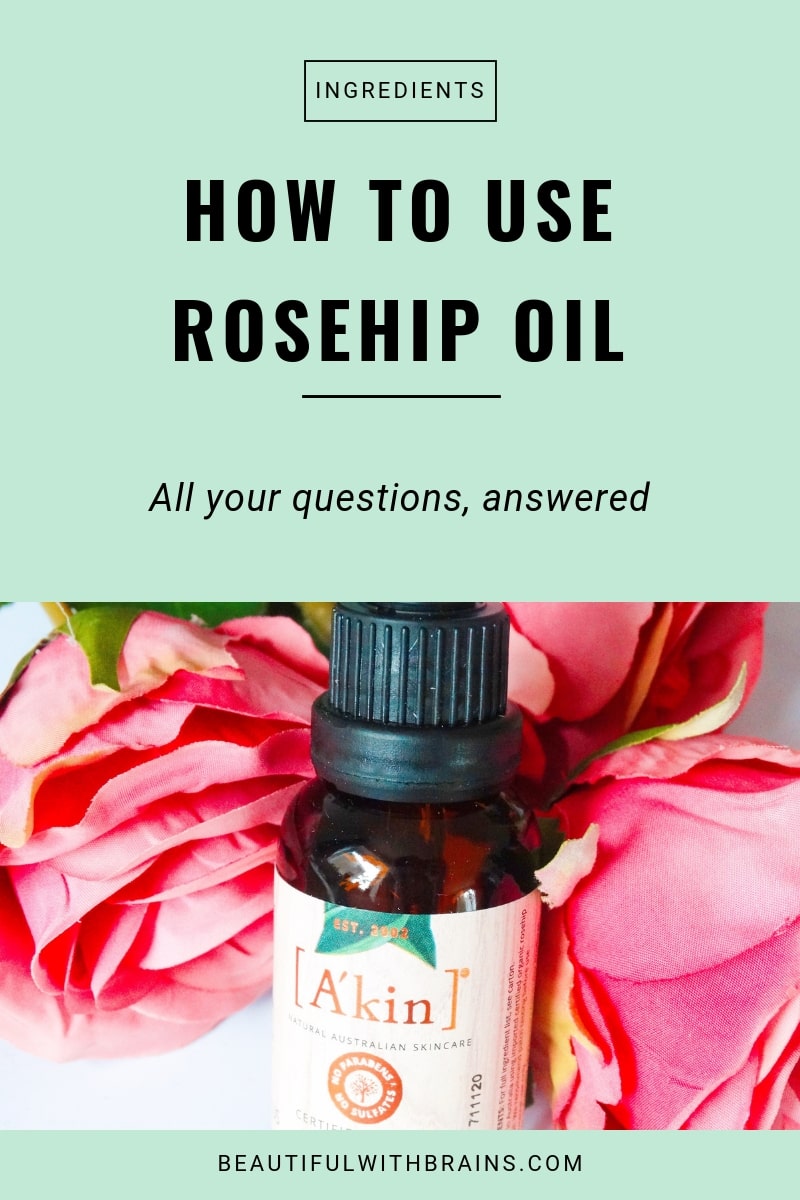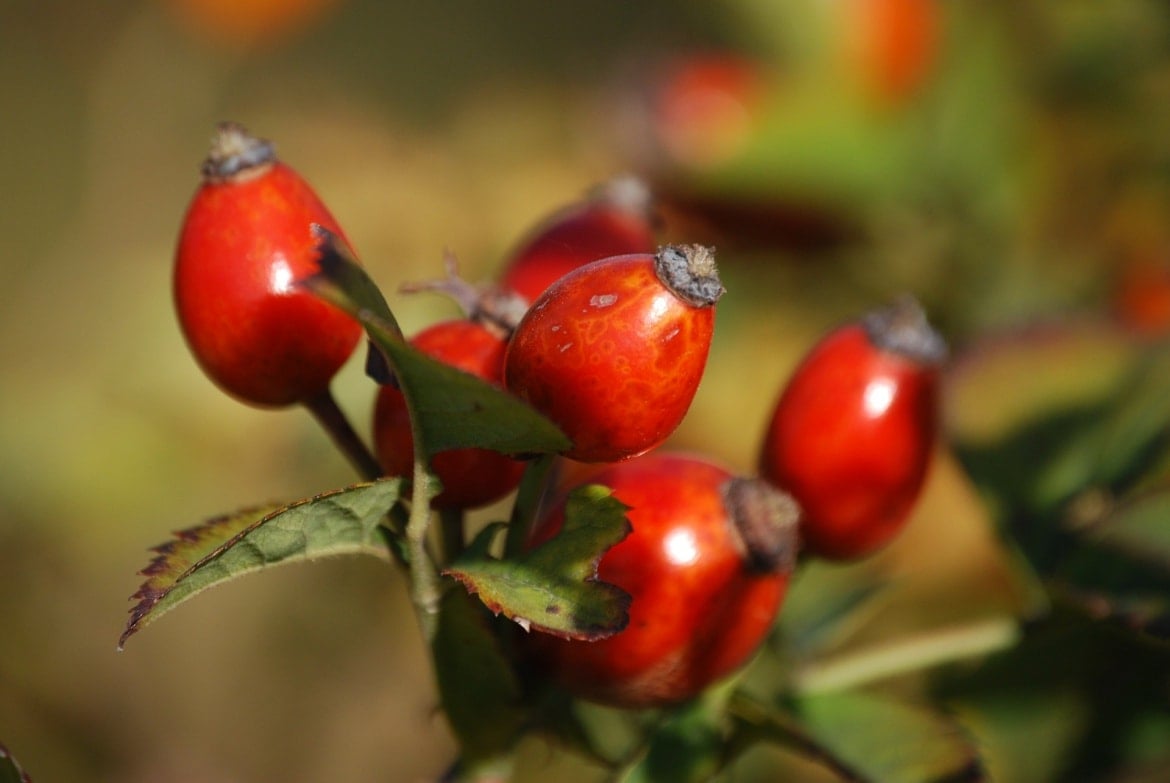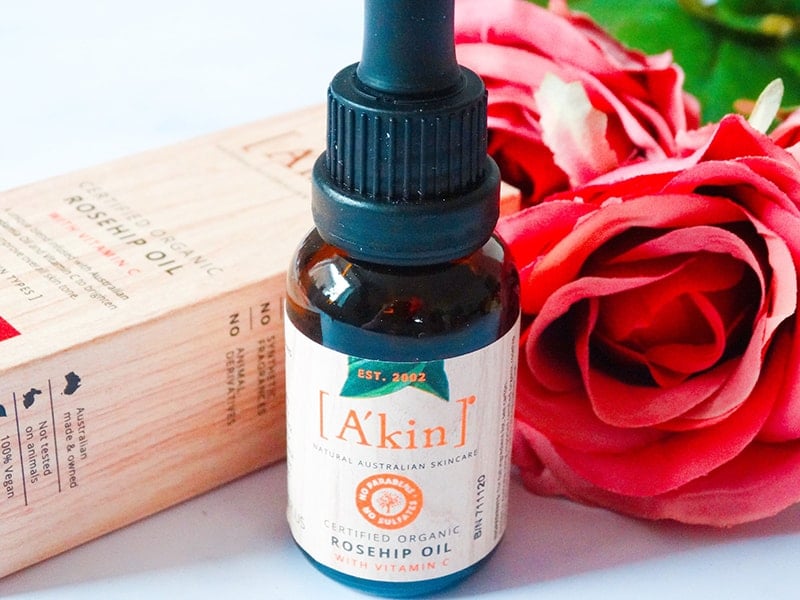
How the heck do you use rosehip oil?
I kid you not, this is the #1 question in my inbox right now. It’s my bad. I’ve been raving about rosehip oil for months.
It’s my go-to for every skin woe. Whether a pimple has reared its ugly head on my chin, my retinol serum has dried my cheeks a little too much or my complexion just needs a pick-me-up, I can count on rosehip oil to kick my skin back into shape, pronto.
But I’ve never told you how to use rosehip oil. Like, what’s its place in your skincare routine? How do you layer it with other actives? And can anyone use it?
Here are the answers to these – and more – questions about how to make the most of rosehip oil:
1. What Makes Rosehip Oil So Awesome For Your Skin?
Rosehip oil is loaded with goodies your skin can’t live without:
- Antioxidants: rosehip oil has plenty of antioxidants, including vitamins C & E, to fight and destroy the free radicals that cause premature aging.
- Linoleic acid: this fatty acid makes up more than 60% of rosehip oil. It’s super moisturising, helps fight acne and soothes irritations.
- Vitamin A: a powerful antioxidant that fights free radicals, boosts collagen production and speeds up cellular turnover (i.e., the skin’s natural exfoliating process).
All this sciencey jargon means that rosehip oil helps you fight premature wrinkles, fade away dark spots and kick acne in the butt.
Related: Why Rosehip Oil Is My-Go For Every Skincare Woe
2. Is Rosehip Oil A Strong Retinoid?
If you’re new to skincare jargon, retinoid is the family name for all forms of vitamin A (retinol, retinaldehyde, retinoic acid & co). Vitamin A is the only thing proven to really reduce wrinkles but it can irritate your skin pretty bad. That’s why retinoids come in different forms and strengths.
Rosehip oil has its fair share of vitamin A so it qualifies as a retinoid in my book. But is it a strong one?
That’s a hard question to answer. When it comes to a synthetic form of vitamin A, like retinol, you know exactly how much of it is in the formula.
With natural ingredients like rosehip oil, things aren’t so clear cut. The amount of vitamin A (and anything else, for that matter) in rosehip oil depends on several factors, like soil conditions, climate, distillation and refining process (FYI, the unrefined type usually has more vitamin A & antioxidants but it’s also more irritating), etc…
Two batches of rosehip oil can contain different amounts of vitamin A (even if they’re from the same brand!).
But I can tell you this: rosehip oil is NOT as strong as prescription retinoids, like tretinoin. It’s also gentler than most OTC retinoids, like retinol (thank its moisturising fatty acids, like linoleic acid, for that).
So if you’re starting out on your retinoid journey or have sensitive skin, rosehip oil is a good choice for you.
Related: Which Form Of Vitamin A Is Right For You?
3. Is Rosehip Oil Suitable For A First-Time Retinoid User?
If you’re in your mid-20s and want to up your anti aging game, rosehip oil is the perfect way to start on your retinoid journey.
While most OTC retinoid serums can be drying, the fatty acids in rosehip oil soothe and moisturise your skin, minimising the peeling and irritation.
Related: What Strength Of Retinol Do You Need?
4. Can You Use Rosehip Oil Together With Another Retinoid?
In theory, you can. I know women who use rosehip oil with tretinoin to lessen the peeling and irritation they get from it. It works for them.
I’d say most people can pair rosehip oil with another retinoid. But if you have sensitive or dry skin that’s easily irritated, this combo may be too much for you.
If you want to use both, try this combo on a small patch of facial skin first and see how your skin reacts to it. Your skin will tell you if it likes it or not.
Related: How To Do A Patch Test
5. Can You Use Rosehip Oil After Vitamin C & AHAs?
Vitamin C and AHAs are two anti aging superstars. Vitamin C is a powerful antioxidant that fights free radicals, brightens skin and boosts collagen. AHAs are a family of exfoliants that get rid of dead skin cells, helping to fade away fine lines and dark spots.
They have one thing in common: high concentrations can be irritating. So, can you use rosehip oil – a natural source of vitamin A – with them?
Again, it depends. Most people will be able to use them together without problems. But if your skin is sensitive, there’s the small chance all these strong actives may make it act out and irritate it.
P.S. If you have sensitive skin, I recommend you stick to lactic acid (the gentlest member of the AHAs family) and vitamin C derivatives. Anything stronger than that can wreak havoc on your delicate skin.
Related: Can You Use Vitamin C If You Have Sensitive Skin?
6. Where Does Rosehip Oil Fit Into Your Skincare Routine?
Oils are the last step of your skincare routine.
Here’s the deal: oils are occlusive. They form a barrier on the skin that keeps moisture in. But this barrier also keeps stuff out.
If you were to apply a serum after rosehip oil, most of its active ingredients wouldn’t make it through this barrier. Don’t waste your precious skincare products like that. Use the oil last.
Related: What Is The Right Order To Apply Skincare Products?
7. Can You Use Rosehip Oil With Moisturiser?
It depends. If you have dry skin that needs the extra moisture, using oil rosehip after your moisturiser is a good idea.
For all other skin types, rosehip oil can take the place of your moisturiser. Unless, your moisturiser contains some actives (for example, niacinamide) you don’t want to give up.
I like to keep my skincare routine as short as possible, so I use rosehip oil as moisturiser.
Related: Does Everyone Need A Moisturiser?
8. Can You Use Rosehip Oil Every Day (Morning And Night)?
I like to use rosehip every now and then, when my skin is pimply, dry or not looking its best. But you can use it every night, if you wish.
I don’t like using oils in the morning. They don’t always play well with your sunscreen and makeup. If you find one that does, go ahead. Just don’t forget to pile on your sunscreen afterwards!
9. Can You Use Rosehip Oil If You Have Oily Skin And/Or Acne?
It depends on what type of acne you have. If it’s the fungal kind, stay away. The fatty acids composition of rosehip oil can feed malassezia, the fungus that’s making your life hell. Boo!
Got bacterial acne or just annoyingly oily skin? Rosehip oil is your new BFF. Studies show rosehip oil can treat mini pimples.
Here’s how it works: acne patients usually lack linoleic acid in their skin. Rosehip oil has a TON of it. By putting it back in, you help your skin heal faster.
Plus, rosehip oil is lightweight and fast-absorbing. It won’t leave a greasy mess all over your skin. Phew!
Related: How To Fight Acne With Oils (And Which Ones To Choose)
10. Can Pregnant Women And Nursing Mums Use Rosehip Oil?
Prescription retinoids are strictly forbidden during pregnancy and breastfeeding. Studies show they cause birth defects in mice.
But rosehip oil isn’t a prescription retinoid. Pregnant women have been using it for centuries to prevent stretch marks and moisturize skin. Studies seem to confirm it’s safe during pregnancy, too.
But I totally get it if you prefer to give it a pass – just to be on the super safe side.
Related: What Ingredients Should You Avoid During Pregnancy?
11. What’s The Best Type Of Rosehip Oil?
I can’t answer this for you. Disappointing, I know. But hear me out…
Remember when I told you that every batch of rosehip oil has a slightly different composition? That makes it impossible to compare different products – unless you try them all yourself.
The best you can do is to opt for the cold-pressed, unrefined kind whenever possible. The more the oil is processed, the more vitamins and antioxidants it loses.
But I won’t leave you with nothing. I’ve tried my fair share of rosehip oils in the past, so here are my personal top 3 picks:
- A’Kin Brightening Rosehip Oil With Vitamin C (£24.00): available at Feel Unique and Look Fantastic
- The Ordinary 100% Organic Cold-Pressed Rise Hip Seed Oil (£9.00): available at Beauty Bay, Cult Beauty and Feel Unique
- Trilogy Certified Organic Rosehip Oil ($29.00): available at Content Beauty Wellbeing, Feel Unique and Ulta
SHOP THE POST
I hope this post answers all your questions about how to use rosehip oil. If not, ask away in the comments below.






4. CAN YOU USE ROSEHIP OIL TOGETHER WITH ANOTHER RETINOID?
I use a nighttime lotion w/.02% Tretinoin, 5% Azeliac Acid and 4% Niacinamide.
Would I use the Rosehip Oil before or after?
Cbren, rosehip is always the last step of your skincare routine.
Cbren, what is the name of the lotion you use?
Thank you so much for this post Gio! I’ve waiting to buy The Ordinary’s rosehip oil for a while now. I’m a big fan of their Marula oil, but I found out that while it’s a great product for the skin, it works wonders on my hair.
So it seems that Rosehip is a bit more interesting for the skin and I’ve been thinking about replacing the Marula one for it in my facial massage routine.
Mariana, they’re both great oils but I’m with you, rosehip oil goes that little extra mile for your skin. 🙂
Dear Gio, when I’ve first discovered your blog I’ve read all of it, from start to finish. It’s so informative and truthful for everyone who wants to know how skincare and ingredients really work. Anyway, I didn’t have any reasons to leave here a message until I’ve read some disturbing articles on a Canadian beauty blog (the skin care edit) about the harmful effects of polyunsaturated oils.
I’ve tried several times to post a comment here and it doesn’t show. Maybe cause it contained some links? Please, please, please, what’s your opinion about the oil’s ageing skin risk. I trust your opinion and I really hope this time my comment will appear here. Thanks so much for what you’re doing here!
Gabi, thanks so much for your support. So glad you’re enjoying my blog. And so sorry you had problems posting here. This is the only comment I’ve received from you on this post.
An unbalance of polyunsaturated oils in your diet may lead to inflammation and aging. But as long as you eat more omega-3 than omega-6 fatty acids, you’re gonna be fine. This is a case of too much of a good thing being bad. But it’s not a good enough reason to avoid them in your skincare. This post by Labmuffin explains why in more details: https://labmuffin.com/unsaturated-oils-bad-skin/
Thank you so much for your answer, I was about to toss my extra virgin cold pressed sunflower, pumpkin and grapeseed oils, but I’m glad I didn’t.
Gabi, no need to toss them. Just use them in moderation, like everything else. 🙂
The ONLY thing my hardy, healthy middle-aged face has ever hated was The Ordinary’s Rosehip Oil. Within an hour of using the oil, my entire face and neck were covered in huge, swollen, itchy red hives. This reaction took three days to subside, and left me with ruined skin. My normally fine texture was thick and rough. My usually even tone was blotchy and red. It was a solid 2 months before I regained my good skin.
I have no allergies. I do not have sensitive skin. I regularly try to new brands and treatments without trouble. My skin was in great shape when I tried the rosehip oil. I did not mix products. The single worst skincare experience of my life.
Merry, oh no, I am so sorry to hear this! Unfortunately, you can develop a negative reaction to anything at any time. 🙁
Hi Gio,
I just came across your blog and I can’t stop reading it! I was wondering if I could mix my rosehip oil with my moisturizer (aloe vera gel + cerave PM facial moisurizer) after my serums.
Thanks!
Diana, yes you can!
Hey, so I use Trilogy Rosehip Oil Antioxidant+ every morning as my Vitamin C antioxidant serum (since it contains Acai, Tomato seed and Cranberry which are high in vitamin C). Then, 3 nights a week (and sometimes every night), I use a prescription retinol (Tretinoin 0.025%). My question is, is it okay to use Rosehip oil the same day as a prescription retinol? I would really appreciate a professional opinion, thanks.
Esther, it depends how sensitive your skin is. Most people can use rosehip oil after tretinoin without problems.
Hi, I didn’t realise rosehip oil had these properties and I just recently got the ordinary one. I’m only 22, is it safe for me to use? I’ve noticed no irritation since I started using it this week. I have very dry sensitive/eczema like skin and already getting fine lines on my forehead.
Sarah, if it doesn’t bother your eczema, you can use it safely.
Hey there , can i use ordinary lactic acid 10% with rosehip oil?? I should layer it? If yes which one comes first or i should mix both the products??
Yumna, you can use lactic acid a couple of nights a week and layer rosehip oil on top.
Hi Gio. Loved your info about Rosehip Oil. I have hormonal acne will rosehip oil work and what routine can I follow. Thanks
Sashni, check out this post for hormonal acne: https://www.beautifulwithbrains.com/ultimate-guide-dealing-hormonal-acne/
If you need more help with your skincare routine, you can book your consultation here: https://www.beautifulwithbrains.com/skincare-consultation/